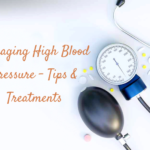Introduction
High blood pressure, also known as hypertension, is often termed the “silent killer” for its ability to quietly inflict serious damage to the body over time. Despite its common occurrence, managing high blood pressure can be challenging, primarily due to the lack of visible symptoms until significant harm has already been done. This blog delves into effective tips and treatments to keep your blood pressure in check.
Understanding High Blood Pressure
High blood pressure is a condition where the force of blood against the artery walls is too high, often leading to severe health complications such as heart disease, stroke, and kidney damage. While many factors contribute to high blood pressure, lifestyle choices and genetic predispositions are at the forefront.
Causes of High Blood Pressure
- Diet and Lifestyle: A diet high in sodium, fat, and processed foods can significantly contribute to hypertension. Sedentary lifestyles and excessive alcohol consumption also play a critical role.
- Genetics: Family history can predispose individuals to hypertension, making it essential to monitor blood pressure regularly.
- Stress: Chronic stress can cause temporary spikes in blood pressure, and over time, can lead to permanent hypertension if not managed effectively.
Symptoms and Dangers
The dangers of high blood pressure are often underestimated because it typically presents no symptoms until significant damage occurs. Some individuals experience hypertension headaches, which can be a sign of dangerously high blood pressure levels. Frequent check-ups are crucial for early detection and treatment.
Are We Overmedicating?
One hotly debated topic in the medical community is whether we are too quick to prescribe medications for high blood pressure. Blood pressure medications are effective, but they come with potential side effects, such as dizziness, headaches, and even kidney damage. Some argue that lifestyle changes should be the first line of defence before resorting to pharmaceuticals.
Blood Pressure Medications
Medications are often necessary for managing high blood pressure, especially in cases where lifestyle modifications alone are insufficient. Common classes of hypertension treatment include:
- Diuretics: Assist the kidneys in expelling sodium and water, thereby decreasing blood volume.
- Beta-blockers: Reduce the workload on the heart and open blood vessels.
- ACE inhibitors: Relax blood vessels by preventing the production of a natural substance that constricts them.
- Calcium channel blockers: Prevent calcium from entering the heart and blood vessel cells, resulting in lower blood pressure.
While effective, these medications can sometimes lead to side effects that impact the patient’s quality of life, leading some to question if the benefits always outweigh the risks.
Holistic and Lifestyle Approaches
Many health professionals advocate for a more balanced approach, combining medication with lifestyle changes. This strategy not only addresses the symptoms but also targets the root causes of high blood pressure.
Diet and Exercise
Adopting a heart-healthy diet, such as the DASH (Dietary Approaches to Stop Hypertension) diet, can significantly reduce blood pressure levels. This diet emphasises on fruits, vegetables, whole grains, and lean proteins while minimising salt, red meat, and added sugars.
Regular physical activity is equally important. A combination of aerobic exercises, like walking or swimming, and strength training can help lower blood pressure and improve overall cardiovascular health.
Stress Management
Chronic stress is a known contributor to high blood pressure. Techniques such as yoga, meditation, and deep-breathing exercises can help manage stress levels effectively. Mindfulness and alternative therapies like acupuncture, also show promise in reducing blood pressure.
Natural Supplements
There is growing interest in natural supplements for high blood pressure treatment. Supplements such as omega-3 fatty acids, garlic, and potassium have shown potential in lowering blood pressure. However, these should be used with caution and under medical supervision, as they can interact with prescribed medications.
Hypertension Headache: A Warning Sign
One of the more distressing symptoms associated with high blood pressure is the hypertension headache. These headaches are often severe and can indicate dangerously high blood pressure levels, necessitating immediate medical attention. If you experience such headaches, it’s crucial to consult a healthcare provider to evaluate your blood pressure and adjust your treatment plan as necessary.
The Future of Hypertension Treatment
Advancements in medical research continue to shape the future of hypertension treatment. Innovations such as wearable technology for continuous blood pressure monitoring and personalised medicine based on genetic profiling offer hope for more effective management of high blood pressure.
Conclusion
Managing high blood pressure requires a multifaceted approach. While medications play a vital role, they should not be the sole focus. Lifestyle changes, stress management, and a balanced diet are equally important in maintaining optimal blood pressure levels. Always consult with a healthcare professional to develop a comprehensive treatment plan tailored to your specific needs.
By staying informed and proactive, you can effectively manage high blood pressure and reduce the risk of serious health complications. Remember, your health is in your hands—take control today! For more info visit www.jainhospitalkhanna.com.

